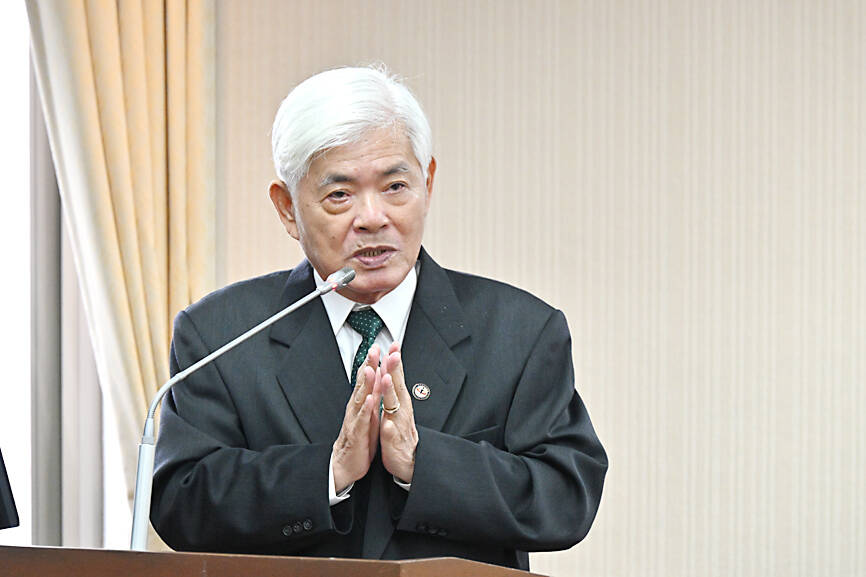A draft amendment proposing that an elected official can only be recalled if the number of recall votes exceeds the number of votes with which they were originally elected is based on a questionable argument, the Central Election Commission (CEC) said yesterday, adding that Taiwan would become the only country with such a recall system if it is passed.
The legislature’s Internal Administration Committee yesterday reviewed draft amendments to the Public Officials Election and Recall Act (公職人員選舉罷免法), including one motioned by Chinese Nationalist Party (KMT) Legislator Hsu Yu-chen (許宇甄) to increase the threshold for passage.
This proposal would make it difficult, but not impossible for elected officials to be recalled, Democratic Progressive Party (DPP) Legislator Tsai Yi-yu (蔡易餘) said, citing the example of former Kaohsiung mayor Han Kuo-yu (韓國瑜), who was recalled with 939,090 votes after being elected as major with 892,545 votes.

Photo: George Tsorng, Taipei Times
However, none of the other recall elections held in recent years had a voting rate greater than that of their regular election counterparts, he said, adding that the threshold proposed by Hsu would make future recalls unlikely to succeed
No threshold was set in the act on recall voting rates, and the legal force of a recall vote should not be invalidated because of a low turnout, CEC Chairman Lee Chin-yung (李進勇) said.
The votes an official received in their election should not be used as a benchmark for the votes necessary to recall them, as some people who voted them into the post might change their mind and vote to recall them, Lee said.
The current recall mechanism is deficient due to the low passage thresholds for the petition and the recall election, making it easily abused for political means, Hsu said.
Polls have shown that more than half of the public are opposed to allowing the minority to invalidate the majority, and they agreed with the amendment, Hsu said.
Lee said that Hsu’s phrasing of “the minority invalidating the majority” oversimplified the problem, as turnouts, voting rates and numbers of candidates differ between recalls and elections.
The problem does exist and can be discussed, but comparing recall votes with original votes is an unsuitable solution, he said.
Meanwhile, DPP lawmakers quarreled with KMT Legislator Hsu Hsin-ying (徐欣瑩), who hosted the committee meeting and reduced the speaking time for each legislator, saying that there were too many speakers.
She muted the microphone when some DPP lawmakers were speaking, causing complaints from the DPP caucus.

The High Prosecutors’ Office yesterday withdrew an appeal against the acquittal of a former bank manager 22 years after his death, marking Taiwan’s first instance of prosecutors rendering posthumous justice to a wrongfully convicted defendant. Chu Ching-en (諸慶恩) — formerly a manager at the Taipei branch of BNP Paribas — was in 1999 accused by Weng Mao-chung (翁茂鍾), then-president of Chia Her Industrial Co, of forging a request for a fixed deposit of US$10 million by I-Hwa Industrial Co, a subsidiary of Chia Her, which was used as collateral. Chu was ruled not guilty in the first trial, but was found guilty

DEADLOCK: As the commission is unable to forum a quorum to review license renewal applications, the channel operators are not at fault and can air past their license date The National Communications Commission (NCC) yesterday said that the Public Television Service (PTS) and 36 other television and radio broadcasters could continue airing, despite the commission’s inability to meet a quorum to review their license renewal applications. The licenses of PTS and the other channels are set to expire between this month and June. The National Communications Commission Organization Act (國家通訊傳播委員會組織法) stipulates that the commission must meet the mandated quorum of four to hold a valid meeting. The seven-member commission currently has only three commissioners. “We have informed the channel operators of the progress we have made in reviewing their license renewal applications, and

Taiwan People’s Party (TPP) Chairman Huang Kuo-chang (黃國昌) yesterday appealed to the authorities to release former Taipei mayor Ko Wen-je (柯文哲) from pretrial detention amid conflicting reports about his health. The TPP at a news conference on Thursday said that Ko should be released to a hospital for treatment, adding that he has blood in his urine and had spells of pain and nausea followed by vomiting over the past three months. Hsieh Yen-yau (謝炎堯), a retired professor of internal medicine and Ko’s former teacher, said that Ko’s symptoms aligned with gallstones, kidney inflammation and potentially dangerous heart conditions. Ko, charged with

Taiwan-based publisher Li Yanhe (李延賀) has been sentenced to three years in prison, fined 50,000 yuan (US$6,890) in personal assets and deprived political rights for one year for “inciting secession” in China, China's Taiwan Affairs Office spokesman Chen Binhua (陳斌華) said today. The Shanghai First Intermediate People’s Court announced the verdict on Feb. 17, Chen said. The trial was conducted lawfully, and in an open and fair manner, he said, adding that the verdict has since come into legal effect. The defendant reportedly admitted guilt and would appeal within the statutory appeal period, he said, adding that the defendant and his family have